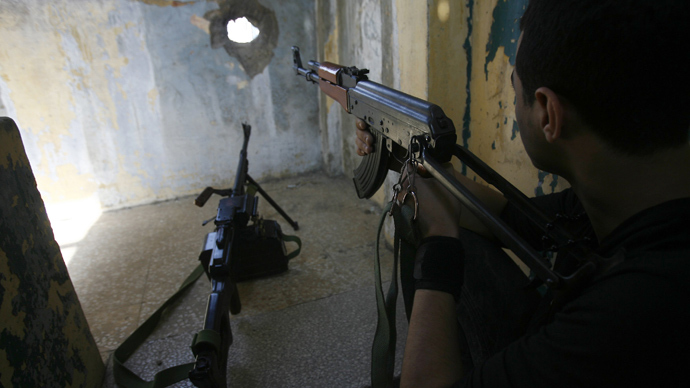EU blacklisting of Hezbollah military wing is over Syria involvement

The EU has blacklisted the armed wing of the Lebanese group Hezbollah as a terrorist organization, citing a bombing from last year. This may not be the sole motivation, Sami Ramadani, senior lecturer in sociology at London Metropolitan University told RT.
The UK and the Netherlands insisted that sanctions be placed on the wing, quoting evidence that the group was behind last year’s attack on a bus carrying Israelis in Bulgaria. Seven people were left dead from the bombing, with a further 13 injured. Hezbollah denied involvement, but Bulgarian investigators say they are sure that the group was behind it.
Dutch Foreign Minister Frans Timmermans said on the
sidelines of a meeting of EU foreign ministers who decided on the
blacklisting that they were “freezing its [Hezbollah’s] assets,
hindering its fundraising and thereby limiting its capacity to
act.”
RT:The decision by EU ministers comes a year after the
bombing in Bulgaria, allegedly plotted by Hezbollah. Why did it
take EU officials so long to react?
SR: Well basically because it’s nothing to do with the
terrorist attack and Bulgaria, because Bulgaria itself has
declared that it only had circumstantial evidence – even that
circumstantial evidence is very flimsy. European political
figures are on the record as saying that really Bulgaria is not
the issue – the issue is to do with recent developments within
Syria, within Lebanon itself, whereby there are still
possibilities of greater intervention by the west, by the US,
backed by some European counties and Turkey, of further
intervention in Syria.
It is also ironic that they do this at the same time that
Hezbollah’s role in Syria conflict near the Syrian/Lebanese
border primarily is to do with the Hezbollah fighters engaging
with the terror organizations led by Al-Nusra front and Al-Qaeda
type organizations, so Britain, France, and the other EU
countries have just designated Hezbollah –which is really
fighting – the British foreign secretary as well –fighting the
bad guys in Syria.

RT:Putting aside Hezbollah’s activities in the region and
looking at the domestic situation there, it is a key player isn’t
it, in Lebanese politics, so can the entire EU afford to abandon
ties with an entire group that presumably represents a large
percentage of the population in the country.
SR: It’s a substantial force: the best organized, and
certainly as one political party, it has the biggest following of
all. Remember, although Hezbollah is called a Shi’ah organization
because it primarily organizes in the south and some suburbs of
Beirut, but it has a coalition around it of significant
Christian, Sunni Muslim, secular, left, nationalist
organizations, and in fact, all this coalition forms a majority
in the Lebanese parliament. One of the key allies of Hezbollah in
fact is the leader of the Lebanese Parliament.
RT:So what’s the EU saying by distinguishing between the
armed aspect of the movement and the political aspect? Presumably
it will still carry on talking to those who aren’t armed within
Hezbollah? It’s quite confusing, isn’t it – that message?
SR: Yes, it is absolutely, and I think there are sixes and
sevens. It’s partly to placate the US – I think Europe has become
under pressure from the US and Israel to escalate against
Hezbollah, and also I think they are quite worried about
developments in Syria as well. But within a Lebanese context –
Hezbollah is still a very powerful force, and they seem to be
–the west seems to be– increasing its support for the block of
forces opposed to Hezbollah and allies inside Lebanon. And
really, it adds to the tension in the region, if you like, and it
adds fuel to the fires –or potential fires– potential fires in
the Lebanese context as well as the Syrian context.
The statements, views and opinions expressed in this column are solely those of the author and do not necessarily represent those of RT.
The statements, views and opinions expressed in this column are solely those of the author and do not necessarily represent those of RT.












